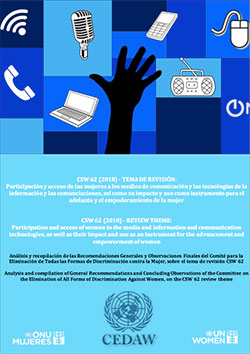
Participation and access of women to the media and information and communication technologies, as well as their impact and use as an instrument for the advancement and empowerment of women

Echoing the recommendations of the 47th session on the review theme, UN Women’s Regional Office for the Americas and the Caribbean has produced a compilation of the relevant recommendations issued by the Committee on the Elimination of Discrimination against Women (CEDAW Committee). The purpose of this compilation is to feed the intergovernmental preparations, negociations and discussions of the key actors on the assessment of the level of implementation in the countries of Latin America and the Caribbean, prior and during CSW 62 session. The compilation seeks, in turn, to feed other related programmatic, coordination and normative processes supported by UN Women at the country level in the region.
The document includes, firstly, the General Recommendations issued by the CEDAW Committee on specific issues related to the review theme (sections II and III), and, secondly, the recommendations reflected as part of the Concluding Observations issued to the States parties that have undergone a periodic examination on the application of the Convention on the Elimination of all Forms of Discrimination against Women (CEDAW) (section IV).
As pointed by out UN Women Executive Director Phumzile Mlambo-Ngcuka, Information Communication Technologies (ICTs) “are especially relevant today, as we face a rapidly changing world of work” and this makes it imperative to ensure that “women and girls acquire the right ICT and STEM (Science, Technology, Engineering and Mathematics) skills to compete on a par with boys and men in the 21st century economy, enjoy greater choice and access better-educated, better-paid jobs.”
The analysis of the recommendations issued by the CEDAW Committee related to the role of media, communication, technologies and information reflect a certain coincidence in the progress and the challenges presented by the different countries of the region. On the one hand, they emphasize the need to ensure greater participation in and access of women to media, information technologies and communications. In this sense, they can serve as instruments for women’s empowerment, facilitating training and education initiatives, especially for women who cannot receive face-to-face training given their personal circumstances, as well as foster their access to non-traditional professions.
The access gap seems to widen in certain groups of women such as rural women, women living with disabilities or women who do not speak the predominant language of their country.
In this regard, breaking the barriers that prevent women and girls from having better access to media, communication and technologies, including illiteracy and language barriers, is a necessity repeatedly expressed with concern by the CEDAW Committee.
On the other hand, media, communication and information systems can stigmatize, denigrate and reify women and girls, including prompting violence against them, as well as reproducing gender models and stereotypes that discriminate and underestimate them. It is thus imperative to closely collaborate with media, communication and information actors and make use of technologies, including social media, to promote social and cultural changes in favor of gender equality. Together with government and state institutions, public and private educational institutions, advertisement agencies, civil society organizations, academia, and other key actors, they are key allies to promote a proper use of communication, information and technology, to help unlearn stereotypes, dismantle social prejudices, and eradicate discriminatory and harmful practices against women. In this joint effort, it is necessary to strengthen the work with education and communication professionals, promote the use of inclusive non-sexist language, analyze the negative impact that language and media can have on reproducing violence against women and other groups, as well as working with legislative and judicial bodies to prohibit and punish women's negative representation.
Furthermore, in addition to breaking traditional gender stereotypes, these media can encourage the construction of new models of society and people who respect the rights of all. Therefore, they play a major role in awareness-raising, dissemination and transmission of information, knowledge and models of inclusive and non-sexist societies.
Media, information and technology are also important instruments for the dissemination of inter alia the CEDAW Convention, its Optional Protocol and the General Recommendations and Concluding Observations issued by the CEDAW Committee to States parties in the different languages of each country.
In short, they play a key role in breaking down the structural barriers that impede the advancement of gender equality and the effective enjoyment of the rights of women and girls.